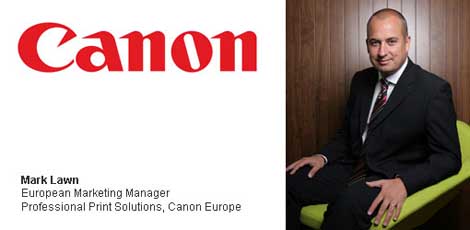- Study reveals that many print service providers would not have survived the downturn without a digital printing capability. Survivors are emerging in a better shape to face the future
- As the end of 2009 approached, printers were optimistic about the future
- Printers who moved into wide format inkjet printing in particular thrived as they found a growing signage and display market
- Redefinition of the Digital Printer’ is the third survey sponsored by Canon Europe and conducted by Professor Emeritus Frank Romano and a team of print media graduates from the Rochester Institute of Technology
Canon Europe, world leader in digital imaging solutions, today reveals the ‘top line’ trends uncovered by a survey of print service providers and industry commentators into the impact of the recession on the printing industry.
The ‘Redefinition of the Digital Printer’ survey, the third to be sponsored by Canon Europe and conducted by Professor Emeritus Frank Romano and a team of print media graduates from the Rochester Institute of Technology in the USA, provides a further snapshot of the state of the printing industry. The results of the previous Canon ‘Insight’ studies into the future of digital printing and into the CRD (Central Reprographic Department) market were published in May 2008 and May 2009 respectively.
For this third survey, Professor Romano’s team interviewed the largest sample to date, a total of 840 printers, 65.5% of whom were based in Western Europe. The sample included 383 of the 464 interviewed for the 2008 study, the remaining 81 having either merged or gone out of business.
The final analysis of the Redefinition of the Digital Printer’ survey is currently being completed and the results will be published in May 2010. The key findings of the survey demonstrate how important the adoption of digital printing has been to the survival of professional printers and how those emerging from the recession are likely to be better positioned to exploit future opportunities and overcome future challenges:
- In the last quarter of 2008, as marketers slashed print budgets, printers were forced to rethink every aspect of their business and to implement improved production methods to streamline staff and reduce costs. As print runs became much shorter, those who had implemented digital printing were well prepared for the shift. Those with only offset presses, and particularly those with older generation offset presses, were not geared up for it and were therefore not able to meet the changing demands. As printers acted to adapt, sales of digital machines consequently exceeded those of other presses during 2009. For example, the survey shows that while revenues from offset lithographic output declined by 18.1% in Western Europe during 2009 (compared with 2008), revenues from digital (toner and inkjet combined) output increased by a total of 27.2%.
- For the purposes of the survey, ‘digital printing’ included not only document printers, but also wide format inkjet, and it appears that those in wide format printing did particularly well during the economic downturn. In fact, 86% of respondents said that display printing on wide format printers had helped them to survive the downturn. Commercial printers, who had previously avoided wide format as too niche, now discovered a growing market for signage and other display products as well as new industrial market segments for printing on fabrics, canvas and other materials.
- One of the key elements to survival during the recession has been business leadership. Those companies leading the recovery demonstrated that, by focusing on key selected markets (where they could add value) and by providing multi-media services (to differentiate themselves from competitors), they could ensure the long-term future of the business
- Despite the earlier gloom, by the end of 2009 print service providers were reporting some clear optimism about 2010 and the future. This optimism could be founded on the fact that more than half of companies with a digital printing capability improved their revenue and profit in 2009 compared with 2008.
Mark Lawn, European Marketing Manager, Professional Print Solutions, comments: “As with the previous surveys, Canon’s sponsorship of the latest study reflects our ongoing commitment to the development of long-term relationships with our customers, helping them to make informed decisions about their future.
“After the challenges that the print industry has encountered over the past year, it is very encouraging to hear that printers are expressing optimism about their future for 2010. The research clearly shows that companies who are embracing digital print technology to deliver added value services to their customers are now better positioned to take advantage of an evolving market. Digital printing has become an essential element in any successful blended production environment and, at the speed with which the business environment has changed and continues to change, consideration of the adoption of a digital printing capability can no longer be optional for printers.
“If this renewed sense of optimism continues – and we firmly believe that it will – the industry is in for a very exciting Ipex 2010. The exhibition will provide an ideal opportunity for printers to research and consider different ways to take their businesses forward, and Canon’s focus at the show will be to inspire visitors to make that leap.”
With a view to encouraging printers to take an innovative approach to securing the long-term future of their businesses, Canon is today also launching a pan-European ‘Business Leap’ Competition (Please see relevant press release dated 9 February 2010). Inviting entrants to submit a formal business plan for a venture involving digital printing, the competition will illustrate the importance of compiling a comprehensive business case with a strong rationale for investment – crucial for any printer seeking access to finance. The winner will be awarded a fully configured Canon imageRUNNER ADVANCE C9070 PRO, allowing them to transform their business plan into a commercial reality.



